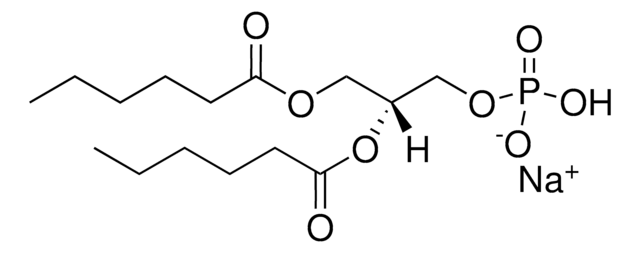830842C
Avanti
08:0 PA
1,2-dioctanoyl-sn-glycero-3-phosphate (sodium salt), chloroform
Synonym(s):
PA(8:0/8:0)
About This Item
Recommended Products
Assay
>99% (TLC)
form
liquid
packaging
pkg of 1 × 1 mL (830842C-10mg)
pkg of 1 × 2.5 mL (830842C-25mg)
manufacturer/tradename
Avanti Research™ - A Croda Brand 830842C
concentration
10 mg/mL (830842C-10mg)
10 mg/mL (830842C-25mg)
lipid type
cardiolipins
phospholipids
shipped in
dry ice
storage temp.
−20°C
InChI
1S/C19H37O8P.Na/c1-3-5-7-9-11-13-18(20)25-15-17(16-26-28(22,23)24)27-19(21)14-12-10-8-6-4-2;/h17H,3-16H2,1-2H3,(H2,22,23,24);/q;+1/p-1/t17-;/m1./s1
InChI key
ZNDNSOYDPUTHKQ-UNTBIKODSA-M
General description
Application
Biochem/physiol Actions
Packaging
Legal Information
Signal Word
Danger
Hazard Statements
Precautionary Statements
Hazard Classifications
Acute Tox. 3 Inhalation - Acute Tox. 4 Oral - Aquatic Chronic 3 - Carc. 2 - Eye Irrit. 2 - Repr. 2 - Skin Irrit. 2 - STOT RE 1 - STOT SE 3
Target Organs
Central nervous system, Liver,Kidney
WGK
WGK 3
Certificates of Analysis (COA)
Search for Certificates of Analysis (COA) by entering the products Lot/Batch Number. Lot and Batch Numbers can be found on a product’s label following the words ‘Lot’ or ‘Batch’.
Already Own This Product?
Find documentation for the products that you have recently purchased in the Document Library.
Our team of scientists has experience in all areas of research including Life Science, Material Science, Chemical Synthesis, Chromatography, Analytical and many others.
Contact Technical Service

![Poly[(R)-3-hydroxybutyric acid] natural origin](/deepweb/assets/sigmaaldrich/product/structures/129/476/7d1c924b-f644-4889-a2d6-d7a923ce382c/640/7d1c924b-f644-4889-a2d6-d7a923ce382c.png)








